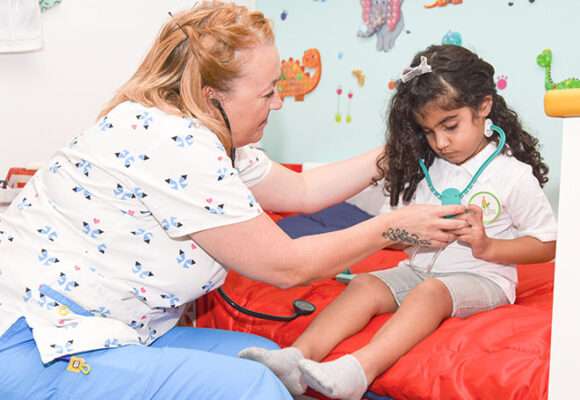Welcome to the first of our health tips series, where we’ll look at some common health issues affecting young children – what they are, how to prevent them, how to treat them and when it’s OK, or not, to bring your child to nursery.
You’ll be pleased to know that at Orange Seeds Nursery, we have a HAAD registered nurse from Burjeel Hospital working with us and looking after the children at all times. In addition, we receive monthly visits from our Pediatrician, Dr. Raghad, from Danat Al Emarat Hospital. Therefore, if you have any concerns or queries, we can happily arrange for you to meet them.
WHAT IS HAND, FOOT AND MOUTH DISEASE?
Hand, Foot, and Mouth Disease is a viral infection that causes small red spots or sores on or in the mouth, hands, and feet and sometimes on the buttocks and legs. These sores can be mild and not cause any discomfort to the child, or they can be very painful. When the sores are weeping/wet, they are also very contagious.
This is a common virus mostly seen in young children and occurs all year round. It can also be contracted by adults.
MODES OF TRANSMISSION
The virus is spread via person to person contact through –
- Respiratory droplets
- Nasal secretion
- Saliva
- Fluid from blisters
- Stools
Children are most contagious during the first week of infection when there are normally no symptoms at all. The sadly means that we are often unaware of it until blisters form or the child feels unwell or gets a fever (although sometimes, there is no fever at all.) The virus can also remain in their body for a few weeks after the signs and symptoms are gone.
SYMPTOMS
You may notice the following symptoms or just some of them –
- Fever
- Sore throat and feeling unwell
- Painful red spots and blisters – lesions on the tongue, gums, inside cheeks, hands, feet, and buttocks. These normally appear 1-2 days into the fever, a week or so after the virus is present.
- Irritability
- Loss of appetite
TREATMENT
We suggest you always seek medical advice before attempting any treatment.
According to our visiting doctor, there is no specific treatment given for this virus and it normally clears up within 7-10 days, however, an oral antiseptic spray may relieve the pain of mouth sores. Adol/Panadol or Calpol pain relievers will also help.
Certain foods and drinks may irritate blisters on the tongue or in the mouth and throat. Try these tips to help make the soreness less bothersome –
- Suck on ice chips
- Eat ice cream or ice lollies
- Drink cold milk or icy water
- Eat soft foods that don’t require much chewing
- Rinse mouth with warm water after meals
- Avoid salty and spicy foods
- Avoid citrus fruits, sugary drinks, and soda.
WHEN CAN MY CHILD ATTEND NURSERY?
If your child has a fever, is unwell or has weeping sores, they must not come to nursery. Once all sores have dried up and your child is feeling well, they can come back to the nursery and join us.
If your child has red spots or sores – but none are weeping, if they have no fever and seem generally well in themselves, they are welcome to come to nursery but will be closely observed by the nurse.
Unfortunately, this virus is at its most contagious before there are any symptoms at all and is only contagious when symptoms are present if the child has weeping sores.
For this reason, it is therefore common for this virus to spread at nursery and any suspected cases are taken very seriously.


